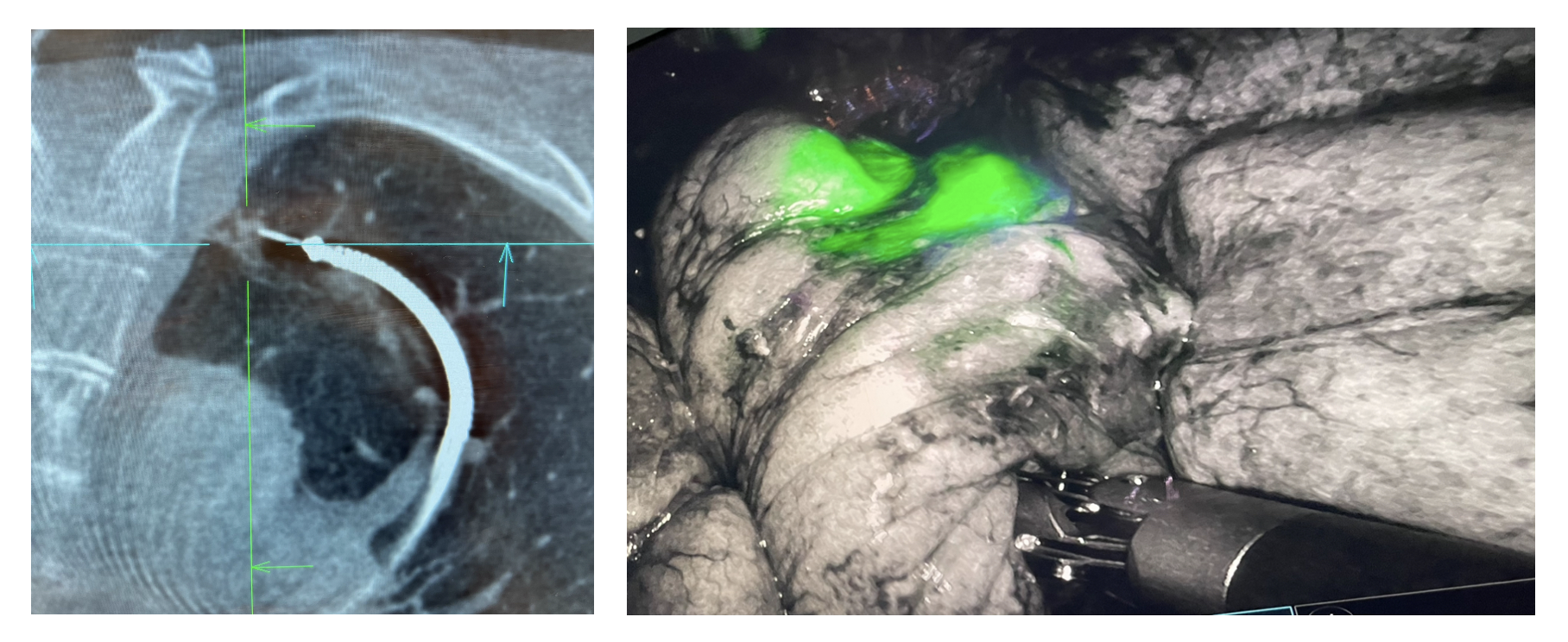By combining cutting-edge technology, unified anesthetic administration, and seamless diagnostic and surgical capabilities, patients now benefit from a rational pathway that consolidates multiple procedures into a Single Anesthetic Event.
Weill Cornell Medicine's multi-disciplinary approach is particularly well-suited for cases where suspicious nodules are detected through regular CT screening scans. While the procedure primarily focuses on early stage (stage I) lung cancer, there are instances where select patients with multiple nodules may also be amenable to this integrated approach.

Image 1 demonstrates intraoperative localization of a 7mm lung nodule using robotic assisted bronchoscopy with 3D fluoroscopic imaging which provides real time visualization and guidance; Image 2 highlights indocyanine green visualized during robotic assisted thoracic surgery which assists the surgeon in localization and removal of small nodules while sparing unaffected surrounding lung tissue
Under the guidance of Dr. Shostak, a robotic bronchoscopy procedure is performed using state-of-the-art 3.5mm cathether with computer guidance, enabling enhanced visualization and precise biopsy of the tumor. Subsequently, our on-site pathologist rapidly analyzes the biopsy samples and if the evaluation of the sample conclusively identifies early-stage cancer of the lung, the tumor area is then marked with fluorescent dye to enhance the precision and extent of surgical resection.
Thoracic surgeon Dr. Villena utilizes minimally invasive robotic-assisted surgery to excise the tumor. In contrast to the extended waiting periods experienced at other institutions, patients at Weill Cornell Medicine are offered expedited appointments and often get discharged within 24 hours after surgery.
Weill Cornell Medicine's commitment to advancing medical innovation positions it at the forefront of lung cancer care. By redefining the treatment pathway for early-stage lung cancer patients with a patient-centric focus, streamlined procedures, and a multidisciplinary approach, the institution aims to improve outcomes and enhance the overall well-being of individuals affected by this disease. By offering lung biopsy and lung surgery in a single procedure, we can expedite the diagnostic treatment for early stage lung cancer patient.
Stage One lung cancer boasts a promising five-year survival rate, ranging from 70 to over 90%. As such, the significance of early detection through regular lung cancer CT screening scans cannot be overstated. Despite recommendations, only 6% of eligible individuals receive annual lung cancer CT scans. As the importance of early detection and efficient treatment becomes increasingly evident, initiatives like the one pushed forward by Weill Cornell Medicine offer hope to individuals facing a lung cancer diagnosis. With continued research, technological advancements, and widespread adoption of comprehensive approaches, the fight against lung cancer is steadily advancing, inching closer to a future where timely and effective treatments are accessible to all, and specifically at-risk underserved populations with less access to multiple hospital visits.
In an era of transformative advancements, Weill Cornell Medicine's commitment to innovation, compassionate care, and patient well-being remains unwavering.